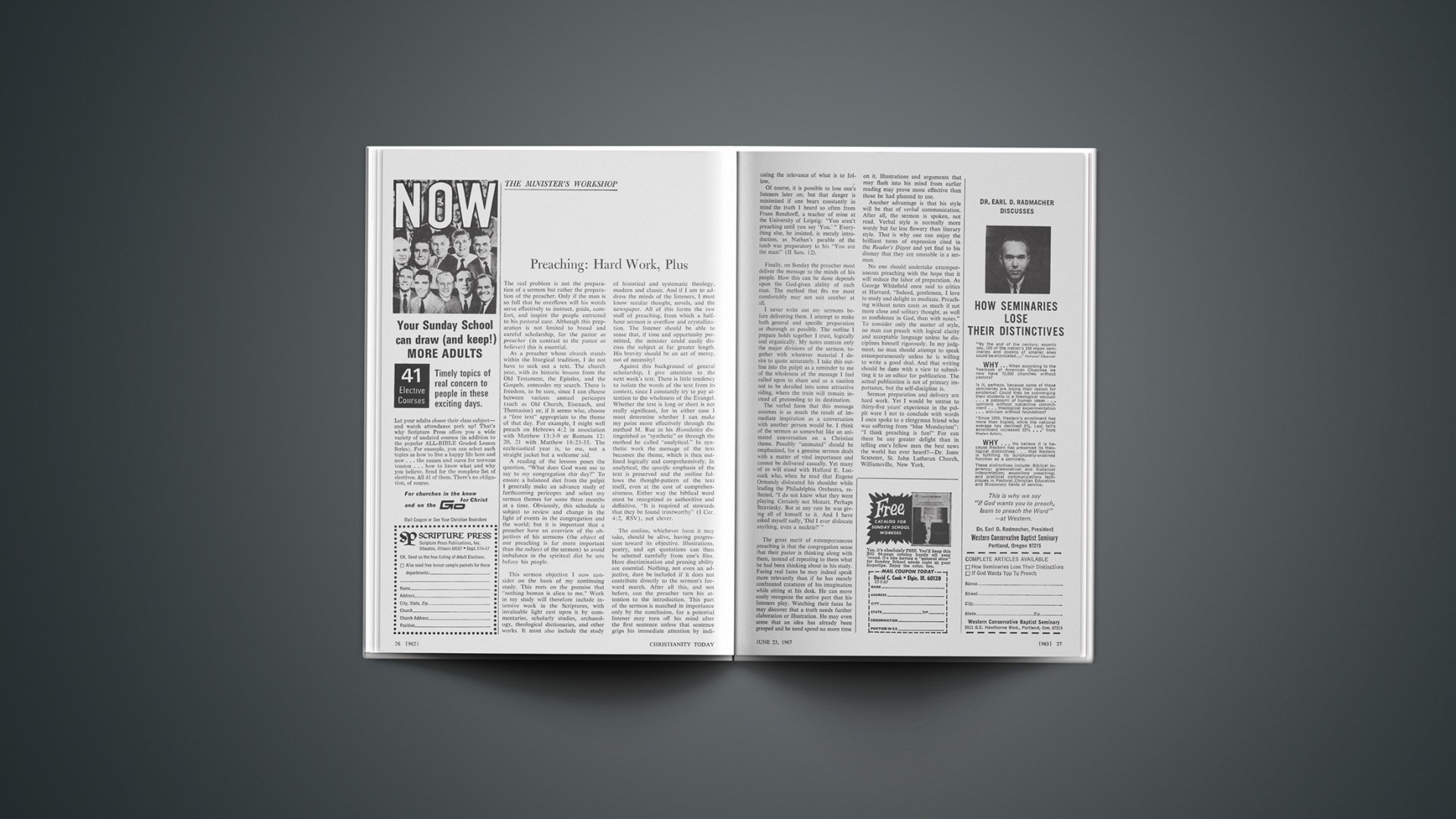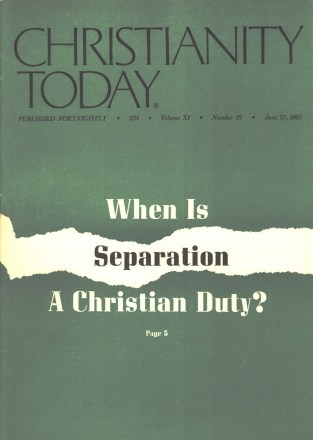The real problem is not the preparation of a sermon but rather the preparation of the preacher. Only if the man is so full that he overflows will his words serve effectively to instruct, guide, comfort, and inspire the people entrusted to his pastoral care. Although this preparation is not limited to broad and careful scholarship, for the pastor as preacher (in contrast to the pastor as believer) this is essential.
As a preacher whose church stands within the liturgical tradition, I do not have to seek out a text. The church year, with its historic lessons from the Old Testament, the Epistles, and the Gospels, antecedes my search. There is freedom, to be sure, since I can choose between various annual pericopes (such as Old Church, Eisenach, and Thomasius) or, if it seems wise, choose a “free text” appropriate to the theme of that day. For example, I might well preach on Hebrews 4:2 in association with Matthew 13:3–9 or Romans 12:20, 21 with Matthew 18:23–35. The ecclesiastical year is, to me, not a straight jacket but a welcome aid.
A reading of the lessons poses the question, “What does God want me to say to my congregation this day?” To ensure a balanced diet from the pulpit I generally make an advance study of forthcoming pericopes and select my sermon themes for some three months at a time. Obviously, this schedule is subject to review and change in the light of events in the congregation and the world; but it is important that a preacher have an overview of the objectives of his sermons (the object of our preaching is far more important than the subject of the sermon) to avoid imbalance in the spiritual diet he sets before his people.
This sermon objective I now consider on the basis of my continuing study. This rests on the premise that “nothing human is alien to me.” Work in my study will therefore include intensive work in the Scriptures, with invaluable light cast upon it by commentaries, scholarly studies, archaeology, theological dictionaries, and other works. It must also include the study of historical and systematic theology, modern and classic. And if I am to address the minds of the listeners, I must know secular thought, novels, and the newspaper. All of this forms the raw stuff of preaching, from which a half-hour sermon is overflow and crystallization. The listener should be able to sense that, if time and opportunity permitted, the minister could easily discuss the subject at far greater length. His brevity should be an act of mercy, not of necessity!
Against this background of general scholarship, I give attention to the next week’s text. There is little tendency to isolate the words of the text from its context, since I constantly try to pay attention to the wholeness of the Evangel. Whether the text is long or short is not really significant, for in either case I must determine whether I can make my point more effectively through the method M. Rue in his Homiletics distinguished as “synthetic” or through the method he called “analytical.” In synthetic work the message of the text becomes the theme, which is then outlined logically and comprehensively. In analytical, the specific emphasis of the text is preserved and the outline follows the thought-pattern of the text itself, even at the cost of comprehensiveness. Either way the biblical word must be recognized as authoritive and definitive. “It is required of stewards that they be found trustworthy” (1 Cor. 4:2, RSV), not clever.
The outline, whichever form it may take, should be alive, having progression toward its objective. Illustrations, poetry, and apt quotations can then be selected carefully from one’s files. Here discrimination and pruning ability are essential. Nothing, not even an adjective, dare be included if it does not contribute directly to the sermon’s forward march. After all this, and not before, can the preacher turn his attention to the introduction. This part of the sermon is matched in importance only by the conclusion, for a potential listener may turn off his mind after the first sentence unless that sentence grips his immediate attention by indicating the relevance of what is to follow.
Of course, it is possible to lose one’s listeners later on; but that danger is minimized if one bears constantly in mind the truth I heard so often from Frans Rendtorff, a teacher of mine at the University of Leipzig: “You aren’t preaching until you say ‘You.’ ” Everything else, he insisted, is merely introduction, as Nathan’s parable of the lamb was preparatory to his “You are the man!” (2 Sam. 12).
Finally, on Sunday the preacher must deliver the message to the minds of his people. How this can be done depends upon the God-given ability of each man. The method that fits me most comfortably may not suit another at all.
I never write out my sermons before delivering them. I attempt to make both general and specific preparation as thorough as possible. The outline I prepare holds together I trust, logically and organically. My notes contain only the major divisions of the sermon, together with whatever material I desire to quote accurately. I take this outline into the pulpit as a reminder to me of the wholeness of the message I feel called upon to share and as a caution not to be derailed into some attractive siding, where the train will remain instead of proceeding to its destination.
The verbal form that this message assumes is as much the result of immediate inspiration as a conversation with another person would be. I think of the sermon as somewhat like an animated conversation on a Christian theme. Possibly “animated” should be emphasized, for a genuine sermon deals with a matter of vital importance and cannot be delivered casually. Yet many of us will stand with Halford E. Luccock who, when he read that Eugene Ormandy dislocated his shoulder while leading the Philadelphia Orchestra, reflected, “I do not know what they were playing. Certainly not Mozart. Perhaps Stravinsky. But at any rate he was giving all of himself to it. And I have asked myself sadly, ‘Did I ever dislocate anything, even a necktie?’ ”
The great merit of extemporaneous preaching is that the congregation sense that their pastor is thinking along with them, instead of repeating to them what he had been thinking about in his study. Facing real faces he may indeed speak more relevantly than if he has merely confronted creatures of his imagination while sitting at his desk. He can more easily recognize the active part that his listeners play. Watching their faces he may discover that a truth needs further elaboration or illustration. He may even sense that an idea has already been grasped and he need spend no more time on it. Illustrations and arguments that may flash into his mind from earlier reading may prove more effective than those he had planned to use.
Another advantage is that his style will be that of verbal communication. After all, the sermon is spoken, not read. Verbal style is normally more wordy but far less flowery than literary style. That is why one can enjoy the brilliant turns of expression cited in the Reader’s Digest and yet find to his dismay that they are unusable in a sermon.
No one should undertake extemporaneous preaching with the hope that it will reduce the labor of preparation. As George Whitefield once said to critics at Harvard, “Indeed, gentlemen, I love to study and delight to meditate. Preaching without notes costs as much if not more close and solitary thought, as well as confidence in God, than with notes.” To consider only the matter of style, no man can preach with logical clarity and acceptable language unless he disciplines himself rigorously. In my judgment, no man should attempt to speak extemporaneously unless he is willing to write a good deal. And that writing should be done with a view to submitting it to an editor for publication. The actual publication is not of primary importance, but the self-discipline is.
Sermon preparation and delivery are hard work. Yet I would be untrue to thirty-five years’ experience in the pulpit were I not to conclude with words I once spoke to a clergyman friend who was suffering from “blue Mondayism”: “I think preaching is fun!” For can there be any greater delight than in telling one’s fellow men the best news the world has ever heard?—Dr. JOHN SCHMIDT, St. John Lutheran Church, Williamsville, New York.










